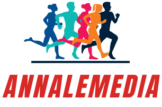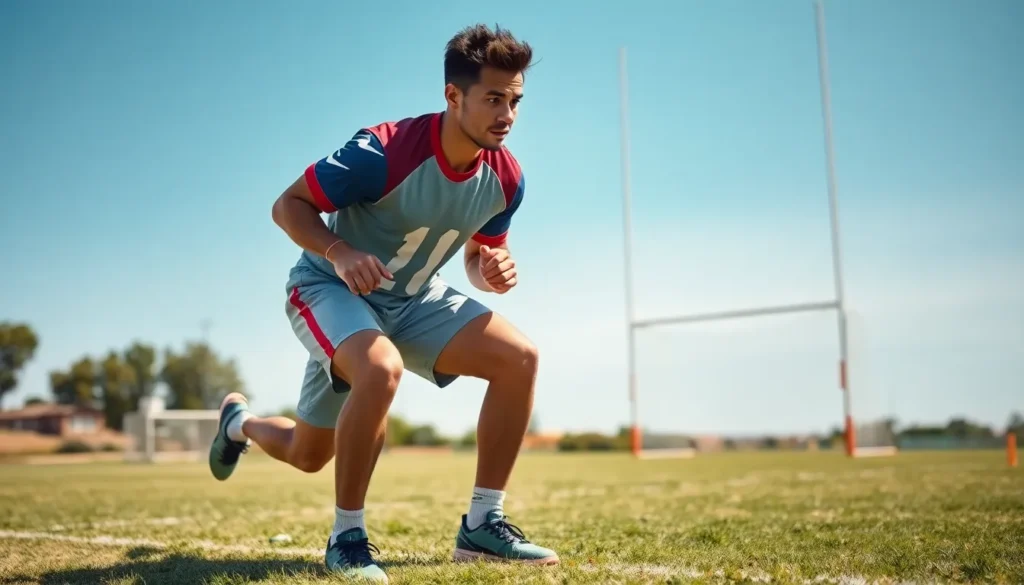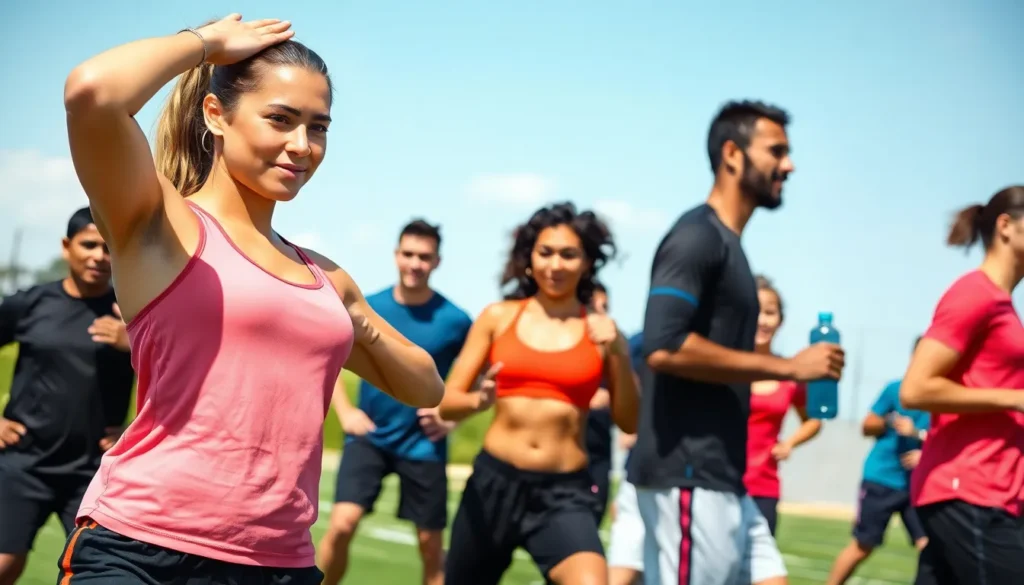In the world of sports, everyone’s looking for that secret sauce to boost performance. Whether it’s running like the wind or shooting hoops like a pro, athletes are always on the hunt for ways to up their game. But let’s face it—most of us can’t just rely on sheer talent alone. It takes a little more than wishing on a shooting star to achieve greatness.
How To Improve Sports Performance
Sports performance refers to an athlete’s ability to execute skills and strategies effectively during competition. It encompasses various physical and mental elements, including strength, speed, agility, endurance, and focus. Each component contributes significantly to overall athletic success.
Strength plays a vital role in enhancing performance across multiple sports. Athletes can achieve greater power and explosiveness through targeted strength training programs. Speed increases competitiveness as faster athletes often gain an advantage during races or in play situations.
Agility allows athletes to navigate quickly and change direction effectively. Incorporating agility drills into training routines can improve performance in sports requiring quick reflexes. Endurance supports sustained effort, enabling athletes to maintain high levels of performance throughout games or events.
Mental aspects also influence sports performance. Focus impacts decision-making abilities, while confidence boosts an athlete’s willingness to take risks and push limits. Incorporating mental training techniques helps athletes develop these critical skills.
Nutrition directly affects sports performance as well. A well-balanced diet provides essential nutrients that support energy levels and recovery. Hydration is equally important, maintaining peak physical condition during intense competitions.
Lastly, recovery strategies cannot be overlooked. Proper rest, sleep, and recovery protocols help athletes avoid injury and maintain consistent performance over time. Developing a comprehensive approach that integrates physical, mental, nutritional, and recovery aspects leads to significant improvements in sports performance.
Key Factors Influencing Performance

Performance in sports hinges on various integral factors. Understanding these elements can significantly enhance an athlete’s capabilities.
Physical Fitness
Physical fitness serves as the foundation for athletic performance. Strength training builds muscular power and explosiveness. Speed training enhances quickness, allowing athletes to react faster during competitions. Agility drills foster better movement and coordination, which are essential during high-pressure moments. Endurance is crucial for sustaining performance throughout events. Regular cardiovascular exercise improves stamina, enabling athletes to maintain intensity. By prioritizing these fitness components, athletes can maximize their overall performance on the field or court.
Mental Toughness
Mental toughness plays a critical role in determining performance outcomes. Confidence directly influences an athlete’s ability to take risks and push boundaries. Visualization techniques help solidify mental strategies, providing clarity in competition. Effective focus enables athletes to concentrate on tasks, minimizing distractions during critical moments. Resilience supports recovery from setbacks, maintaining a positive mindset for future challenges. Emphasizing mental training techniques can enhance these skills, providing a competitive advantage in high-stakes scenarios. By fostering mental toughness, athletes equip themselves to navigate pressures inherent in sports.
Training Techniques for Improvement
Training techniques play a vital role in enhancing sports performance. Focusing on a balanced approach that includes strength and conditioning along with skill development leads to better overall results.
Strength and Conditioning
Strength and conditioning programs build the necessary physical attributes for athletes. These programs encompass resistance training, which enhances muscular strength and power. Incorporating exercises like squats and deadlifts develops key muscle groups. Conditioning drills improve cardiovascular endurance and facilitate recovery. Athletes benefit from explosive movements like plyometrics, which enhance speed and agility. Implementing a periodized training plan allows for systematic progression and adaptation. Consulting with strength and conditioning coaches can provide personalized guidance tailored to individual needs.
Skill Development
Skill development maximizes an athlete’s technical abilities and game-specific performance. Practicing sport-specific drills sharpens essential skills, from shooting in basketball to passing in football. Video analysis aids in identifying areas for improvement, allowing for targeted practice. Incorporating feedback helps refine techniques and foster growth. Partner drills enhance teamwork and communication essential for game scenarios. Regular competitive situations simulate actual game conditions, boosting confidence and decision-making skills. Committing to consistent practice solidifies skills and builds muscle memory, creating a more refined athletic performance.
Nutrition and Hydration
Nutrition and hydration significantly influence athletic performance. A well-structured dietary plan supports energy levels and aids recovery, pivotal for achieving peak performance.
Importance of a Balanced Diet
A balanced diet provides essential nutrients that boost energy and help in muscle recovery. Athletes should consume a mix of carbohydrates, proteins, and fats to fuel their training. Carbohydrates serve as the primary energy source, while proteins aid in muscle repair and growth. Incorporating healthy fats can enhance endurance. Focused intake of fruits and vegetables ensures vital vitamins and minerals are available for optimal immune function and overall health. Meals should be timed strategically; pre-workout meals optimize energy, while post-workout nutrition facilitates recovery. Consistent adherence to a balanced diet leads to improved endurance, strength, and overall athletic performance.
Hydration Strategies
Effective hydration is crucial for maintaining physical performance and cognitive function. Athletes must drink water before, during, and after exercise to replace lost fluids. Targeting specific amounts can be beneficial; for instance, consuming 17 to 20 ounces of water two to three hours before activity aids hydration levels. During prolonged workouts, electrolyte-rich beverages help maintain balance. Post-exercise, drinking 16 to 24 ounces for every pound lost during activity replenishes fluids. Additionally, monitoring urine color can indicate hydration status; pale yellow typically signals adequate hydration while a darker color suggests the need for increased fluid intake. Prioritizing hydration maximizes performance and supports long-term athletic health.
Recovery and Injury Prevention
Recovery and injury prevention play essential roles in enhancing sports performance. Athletes who focus on these areas maximize their ability to compete consistently.
Importance of Rest
Rest significantly impacts performance. It allows the body to heal and adapt after intense training sessions. Athletes who prioritize sleep generally experience improved focus, reaction times, and physical capabilities. The National Sleep Foundation recommends 7-9 hours of sleep for optimal recovery in most adults. Insufficient rest can lead to fatigue and diminished performance. Coaches often emphasize rest days and active recovery techniques to help athletes recharge. Incorporating relaxation strategies, such as mindfulness and deep breathing, further enhances recovery and well-being.
Injury Management Techniques
Injury management techniques are vital for maintaining athletic longevity. R.I.C.E. is an effective method for treating acute injuries, involving rest, ice, compression, and elevation. Athletes learn to identify the signs of injury early, preventing more severe issues. Regular check-ups with sports therapists enable quick assessment and treatment of any problems. Strengthening exercises also help stabilize areas susceptible to injury. Cross-training promotes muscle balance and reduces the risk of overuse injuries. Implementing these techniques ensures athletes can continue training and competing at their best.
Conclusion
Improving sports performance requires a holistic approach that integrates physical training, mental resilience, nutrition, and recovery. Athletes must prioritize strength, speed, agility, and endurance while also honing their mental skills. A well-balanced diet and proper hydration are essential for maintaining energy levels and facilitating recovery.
Additionally, incorporating effective recovery strategies helps prevent injuries and ensures athletes can consistently perform at their best. By committing to a comprehensive training regimen and focusing on each aspect of performance, athletes can unlock their full potential and achieve their goals in sports.



